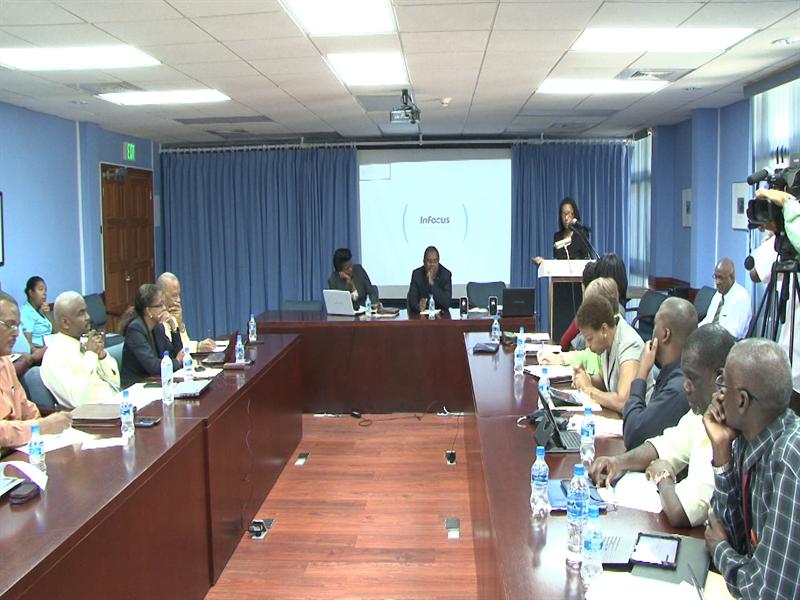The regulator will be responsible for setting tariffs and ensuring delivery of quality service by utility companies.
The Government of Saint Lucia, through its Ministry of Sustainable Development, Energy, Science and Technology, is laying a solid foundation to facilitate multi-million dollar investments in the renewable energy sector.
The Government has set an ambitious goal to position Saint Lucia to generate thirty-five percent of its electricity from renewable sources like wind, solar and geothermal energy by the year 2020. For this to happen, however, new investors must be assured of regulatory certainty in the energy sector.

It is for this reason the Government of Saint Lucia is moving to set up an independent National Utilities Regulator and on Wednesday
February 26, 2014 brought together important public and private sector stakeholders to discuss the draft legislation.
Speaking at the opening of the consultation, the Minister for Sustainable Development, Energy, Science and Technology, Sen. Hon. Dr James Fletcher indicated that if Saint Lucia has to realize real investment in the energy and water sectors, there must be a degree of transparency and fairness in the regulatory environment, as will be facilitated by the proposed National Utilities Regulatory Commission.
“Given that we already have a utility regulator for the water sector, we think it makes sense to combine the two utility regulators for water and electricity into one national utility regulator and this Utility Regulatory Commission is supposed to provide transparent and independent regulation of a utility sector, which we hope in the very near future will not just be dominated by the Saint Lucia Electricity Services Limited (LUCELEC) but by other power producers. In fact, just this week, I have met with investors interested in wind energy development, waste to energy development and even development partners from as far away as New Zealand and Japan who want to assist us with our geothermal development portfolio, so there is a lot of interest in Saint Lucia`s power sector and the only way we can ensure that this interest translates into an orderly and well thought-out development of the energy sector is to have this independent regulator in place,” Dr Fletcher said.
Once established, the National Utilities Regulatory Commission will be responsible for setting tariffs and ensuring quality service by utility companies. Dr Fletcher also stated that government`s position is unwavering on the principle that the independent regulatory body must protect the best interests of consumers.
“I am happy that we have the President of the National Consumer Association here at this very important consultation, because this will now replace the National Water and Sewage Commission and it will set up a new regulator for the electricity sector; it is supposed to protect the consumers and we must ensure that what we do here in providing feedback and input to the draft during the consultation, that it protects the consumers, as that is imperative,” he said.
The Minister also disputed claims that the move to establish an independent National Utilities Regulatory Commission essentially means that Saint Lucia was abandoning membership and support for the Eastern Caribbean Energy Regulatory Authority (ECERA), which was officially launched on November 7, 2013 in Grenada. Dr Fletcher told the capacity audience at Wednesday`s consultation that the Government of Saint Lucia continues to support the philosophy of ECERA, but ECERA’s membership has to increase in order for it to become a viable entity.
He reiterated the Saint Lucia government`s position that ECERA requires a minimum of four OECS Member States to execute its mandate as a true Eastern Caribbean Energy Regulator.
“ECERA has to find a way to bring these other countries who have some interests, like St. Kitts and Nevis, Antigua and possibly Dominica on board as members for it to be viable, otherwise this gestation period where ECERA is now incubating at the OECS Secretariat in the hope that in two years time it will emerge as a full adult that can take care of itself will not happen; what we will have is a stillborn infant, because ECERA as it is right now with just Grenada and Saint Lucia is nonviable,” Minister Fletcher explained.
Minister Fletcher advised that in addition to the need for ECERA to grow its membership, it would also have to find a way to articulate with the domestic energy regulators, similar to what obtains in the regional telecommunications sector.
The Government of Saint Lucia is hoping to have the National Utilities Regulatory Commission Bill enacted as law during the next session of Parliament, following the passage of the 2014-2015 National Budget.